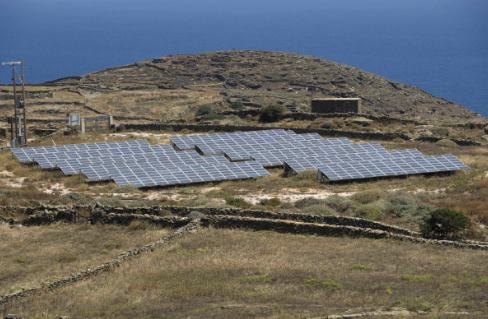Greece’s new strategy for its energy sector and the climate builds on an earlier version of the plan that was published in January by the previous government. However the authorities have tweaked the plan significantly to provide for the new government’s pledge to phase out coal by 2028.
The plan now requires renewables to supply 35% of Greece’s final energy consumption in 2030, up from 31% in the previous plan. Of this, renewable energy systems are set to account for a staggering 61% of Greece’s electricity consumption by 2030. Renewables will also provide 43% of Greece’s heating and cooling and 19% of its transportation needs by the end of the coming decade.
New target
Greece’s new national energy plan mandates 7.7 GW of cumulative solar PV capacity by 2030, up from approximately 2.7 GW of installed capacity at present. Specifically, the plan calls for the nation’s total installed PV capacity to increase from 3 GW in 2020 to 3.9 GW in 2022, 5.3 GW in 2025, and 6.3 GW in 2027.
For Greece’s other renewable energy sectors, the new plan says that the country should also have 7 GW of cumulative wind power capacity by 2030, in addition to 3.7 GW of hydropower, 300 MW of biomass and biogas, and 100 MW of geothermal capacity.
Greece’s latest statistics, published in November, show that it has already installed 2.7 GW of PV, 3.4 GW of hydro, 3.2 GW of wind, and 85 MW of biomass and biogas capacity. The country does not have any offshore wind power capacity, but the new plan does not set a time line for offshore development, other than stating that 250 MW of offshore wind capacity is feasible by 2030.
Tenders, net metering
The vast majority of the new PV capacity will be large-scale, ground-mounted systems awarded via auctions and supported by premium tariffs. The government is expected to publish a review of its tender scheme next year.
Both the competitive auctions and premium tariffs are going to remain a part of Greece’s energy policy. However the new energy plan states that the auctions need to take place under a strict time schedule.
Eventually, the goal is for Greece’s tender exercises to produce tariffs that are similar to other European states, so it can build subsidy-free renewable power plants, according to the new national energy plan.
The biggest challenge for Greek tenders thus far is that they’ve been undersubscribed, despite high interest from domestic and international investors. This is due to a lack of fully licensed projects that are eligible to participate in the tenders. Greece’s energy regulator (RAE) also appears unable to process the steadily growing number of license applications in a timely manner.
The government is now seeking to simplify the licensing process, so the regulator doesn’t have to deal with the cumbersome task. Thus, RAE published recently a simplified structure for Greece’s licensing regime, which was also open to public consultation. The sector is now eagerly anticipating the publication of the new policy, which is imminent.
Greece will run its next tender for solar PV and wind power on Dec. 12.
Small systems are also a part of Greece’s new national energy plan, which envisages 1 GW of net-metered and self-consumption distributed systems by 2030. Together, they will be capable of meeting the electricity needs of at least 330,000 households.
Storage, interconnections and islands
Greece’s uptake of renewable energy to date has happened without the inclusion of any new energy storage facilities. This has to change, according to the new plan, which argues that the country’s phase-out of lignite will require a more flexible electricity system, which can be achieved with new energy storage systems and new interconnections. Therefore, the plan identifies the establishment of a policy framework for energy storage as an immediate priority for the country.
With regard to new interconnections, the plan also provides for a second grid line to Bulgaria, upgrades to an existing line to North Macedonia, and the construction of a new line to link Greece to Cyprus and Israel.
One very important point for the renewable energy sector is the plan’s clear mandate for island interconnections. Greek islands that are not already connected to the mainland grid should either be connected soon or they should embrace new hybrid power systems that use renewable energy and storage. Interconnections are already being built, with a new electricity link between the mainland and the Cyclades Islands now partly operational.
However, the architects of Greece’s new national plan want small islands to develop hybrid systems, so the country can stop subsidizing polluting diesel generators by building storage systems, as on the island of Tilos.
Greece’s new energy plan also provides for greater energy efficiency, electric mobility, and a competitive electricity market that could potentially bring the country’s energy system on par with the latest technological and market developments throughout the world.






